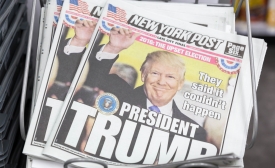racism

How did it happen, and what will happen next?
How can we possibly change perceptions (i.e., global public opinion) about systemic social issues like racism and gun violence when there will most likely be more attacks and in more cities across our country? It makes little sense to continue investing in reactive messaging. What is needed is to create an ongoing dialogue with foreign audiences so that we can share what Americans are doing to confront these issues in their local communities between attacks.

How good local governance can mean good PD.
Homeland […] has been subject to much criticism for its depictions of its Arab and Muslim characters. When, last summer, a group of Arab artists in Berlin were contacted by Homeland set designers to help make one of their sets […] look more authentic with Arabic anti-regime graffiti, they agree—but they splayed the walls with anti-Homeland graffiti instead, attempting, they said to “subvert” the show’s message.
Foreign Policy has plotted the most common Chinese-language Baidu query for each European nation onto the map below. This provides a glimpse into how Chinese netizens view the peoples and countries of Europe — a continent whose industrialization once both humiliated China and inspired its admiration, and that has loomed large in the country’s imagination ever since.
Actress America Ferrera has penned an open letter to Donald Trump in response to his controversial comments about Mexican immigrants. Ferrera has been an advocate for Latino causes and a prominent supporter of Democratic candidates for years. Her tongue-in-cheek post puts a unique spin on the uproar over Trump’s claims that “rapists” and “drug dealers” have entered the U.S. border illegally from Mexico.
FC Barcelona defender Dani Alves sparked a global anti-racism protest by eating a banana that was thrown at him during Sunday's match at Villareal. Alves picked it up, peeled it, and then ate it before taking a corner kick. Barcelona forward Neymar later kicked off the global trend, tweeting an Instagram image of the incident using #SomosTodosMacacos ("We are all monkeys"). The hashtag has since been shared more than 64,000 times.
Does Singapore have a problem with xenophobia? It seems that barely a month goes by these days without news reports highlighting friction between Singaporeans and foreign workers in the tiny, multi-ethnic city-state. The population has increased dramatically in recent decades thanks to an influx of foreigners, who now make up around two out of five residents. This has put a growing strain on jobs, housing and infrastructure, and raised fears about the dilution of the Singaporean national identity.







